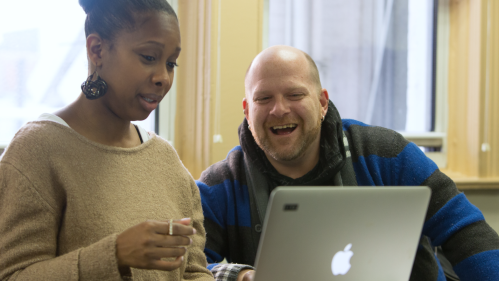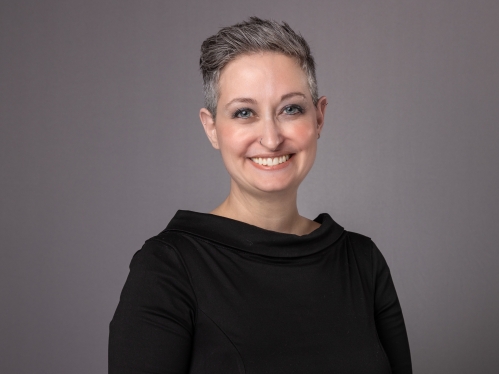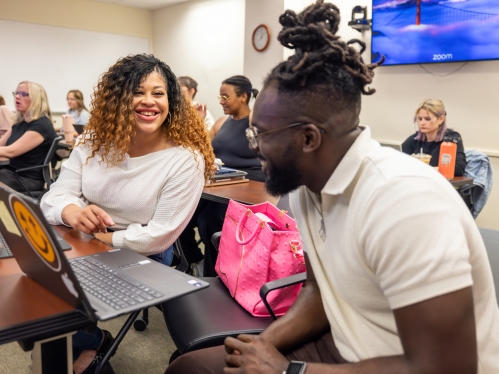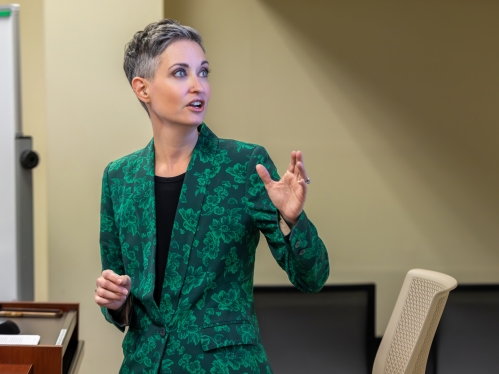
Doctor of Social Work (DSW) Admissions
Thinking of applying to the Rutgers School of Social Work Doctor of Social Work (DSW) program? Learn about our application process and get answers to your questions.
A Message From the DSW Program Director
Dear Prospective Student:
As a former DSW student myself, and once a prospective student, I know you must have several questions as you explore this website: what can I do with a DSW? Will a DSW help me become a true expert in my field? What would it look like to have a “Dr.” in front of my name?
Rest assured, you’ve come to the right place. Getting a DSW was the best decision I ever made. It transformed me from a clinician to a clinician-scholar-activist, allowing me to bridge and navigate the divide between practice and research, and, best of all, translate it for others to help them “buy in” to the valuable work we do as social workers. A DSW will elevate your practice and you will come to ask and answer meaningful, more impactful questions as you approach clients, family systems, policy, and other levels of the field. You will have the skills to identify research that supports your work, but also use that research to improve your own practice and the lives of others.
Our program at Rutgers is specially designed with the clinician in mind. Ours is the only program with a focus on writing as well as multimedia technical skills to empower you in sharing your work both within and beyond academia. After all, your work should move beyond institutions and paywalls of higher learning and into communities to take effect. The arc of our program includes theory, social justice, teaching, administration, and leadership courses that build from one year to the next, with faculty who are invested in your deep learning and success. Faculty serve as more than instructors: we are your mentors, peers, and cheerleaders as you move through the work of the program, and our unique cohort model means that you will be joined by other seasoned clinicians that motivate you to immerse yourself in all that a DSW has to offer. Our focus is not only on helping you to complete the degree but ensuring that you contribute powerfully to the field of social work once you have that degree in hand.
We live in a chaotic world, where social justice issues continue to arise that demand leadership from our profession. You can answer the call by investing in your own education and using what you learn to challenge injustice and step up on interdisciplinary teams, in higher positions of service, and use your voice with clients, community and professional stakeholders. This degree will get you where you need to be, and we are ready to help you get there.

Meet our New DSW Students
This fall, Rutgers School of Social Work welcomes 13 new students to its Doctor of Social Work (DSW) Program. We invite you to learn more about each student and their goals for their time at Rutgers.
Prospective students must meet the following requirements in order to apply for the Rutgers DSW Program:
- An earned MSW from a CSWE accredited program
- Undergraduate degree grade point average of 3.2 or higher (based on a 4-point scale)*
- Master’s degree in social work with a graduate grade point average of 3.6 or higher (based on a 4-point scale)*
- Minimum 2 years post-MSW experience
- LSW
- LCSW is preferred
- No GRE scores required
*If your GPA is below the minimum requirement threshold of 3.2 undergraduate and 3.6 graduate, offer a statement (no more than 1,000 number words, single spaced) of explanation for your GPA and what has changed to lead you to believe that you can successfully complete the DSW program.

Acceptance and Deposit
Students accepted into the Rutgers DSW Program will receive a letter of acceptance and an admission acknowldegement confirmation form to complete. The admission acknowledgement form must be completed and mailed back with a $500 deposit in order for a student to secure their spot in the next cohort. The $500 deposit is non-refundable and will be applied to the upcoming fall tuition.
Need More Information?
- For questions about the Rutgers DSW Program Email Abdul Ali.
- For application questions, contact Graduate and Professional Admissions at 848-932-7711

Learn more about applying and attending the Rutgers DSW Program. Meet some of the faculty, staff, and students that make the Rutgers DSW a unique and innovative program. Info session will be held via Zoom.
DSW or PhD, which is right for me?
Rutgers School of Social Work DSW Prospective Student Form
Questions? Need more information? Please email Abdul Ali or dsw@ssw.rutgers.edu
Upcoming Virtual Information Sessions (please register for the session via the links below):




Priority Deadline: February 1
Final Deadline: April 1
-
The DSW program does not grant social work course credit for: 1) life experience and 2) previous work experience
-
For many years, the Rutgers School of Social Work has offered a Doctor of Philosophy in Social Work (Ph.D.) for those interested in research careers, careers as tenure-track faculty in research universities, and other non-clinical settings. Since 2011, the Rutgers School of Social Work has offered a practice-focused, post-MSW doctor in clinical social work (DSW) for practitioner-scholars interested in building and disseminating practice knowledge and developing into leaders in the field of clinical social work.
Ph.D. programs in general, require approximately 15-20 courses (and a dissertation) and most are organized around quantitative research methods, research techniques, and statistics. Clinical theory and training is not the focus. The Ph.D. is especially appropriate for students wishing to learn quantitative research methods. If your career goal is to conduct social work research, you should consider the Ph.D.
The Rutgers DSW does not privilege practice over research. The program values the integration of clinical wisdom, research findings and theory with post-positivist methods of knowledge-building such as case studies and qualitative research. At best, this model will potentially enrich research, as DSW students and graduates bring to Ph.D. researchers insight into the everyday, real-world practice problems that need practice solutions based on quantitative findings. -
The Rutgers DSW degree prepares you for clinical leadership. This could mean roles as a supervisor, administrator, or teacher. Though a full-time academic career is not a goal for many of our students, some have attained full-time faculty positions at colleges and universities such as Seton Hall University, Monmouth University, Saint Elizabeth College, University of Maryland at Baltimore, and Universidad Interamericana de Puerto Rico. Others come to us already employed at institutions of higher education, seeking to increase their standing and positions within these settings. Many others attain part-time lecturer positions in MSW and BSW programs. Graduates know how to develop their ideas to produce meaningful contributions to the field such as articles, blogposts, and presentations at national and international conferences, which enhances their employability and value in a variety of social work settings.
-
The program is very work/family friendly. Students enrolled in the Rutgers DSW Program are required to be on-site at the Rutgers New Brunswick campus for nine weekend residencies throughout the academic year. Weekend residencies are held once a month on Friday, Saturday, and Sunday from 9:00 AM-4:00 PM and consist of two three-hour modules. In person attendance is required.
-
Classes and DSW faculty and staff offices are located at the Rutgers New Brunswick Campus at 390 George St., New Brunswick, NJ 08901. Our convenient location is just a two block walk from the New Brunswick train station. Restaurants and hotels are also close by to maximize efficiency for students during each weekend residency.
-
The program is tightly structured so that all coursework and assignments logically and progressively lead to graduation in three years. It is expected that students will complete all work in that time frame. In short, no interminable doctoral work! And we offer careful and thoughtful academic support to promote steady and successful progress throughout the three years.
-
Program costs vary from year to year. For more information visit our tuition and fees page.
-
DSW students are considered full-time students, however classes only meet one weekend residency per month, which makes the program accessible for working professionals. In between residencies, students work on their assignments under the consultation and supervision of faculty.
-
In order to apply for the Rutgers DSW Program, students must meet the following:
-
MSW from a CSWE accredited program (domestic students)
-
MSW (or equivalent) from a comparable accredited program (international students only)
-
Minimum 2 years post-MSW experience
-
LSW, unless your field does not require licensure
-
LCSW is preferred
Ideal candidates will have an undergraduate GPA of 3.2 or above and a graduate GPA of 3.6 or above. In additional the the admission requirements, applicants must submit a completed application including three letters of reference, a personal statement, and writing sample.
-
-
No. Our modular program along with our content and philosophy of teaching makes it difficult to compare and substitute courses with those of other programs. Further, the program is designed for everyone to move through as cohorts, thus it does not have the flexibility to transfer credits.
-
Cohorts of up to 16-20 students are accepted every fall.
-
Rutgers DSW students will receive hands-on teacher training from Rutgers School of Social Work faculty and regional and national practitioners. The Rutgers DSW curriculum is designed to help students:
- Recognize the links among theory, research, practice, and policy
- Engage in critical thinking and analysis
- Directly apply scholarly knowledge to various clinical practice contexts
- Tolerate uncertainty and ambiguity and view these elements as part of the process of knowledge development
- Be socialized to scholarly processes and practices
- Develop clinical expertise with a particular population or in a substantive area
- Develop and disseminate scholarly knowledge in academic journals, conference presentations, and innovative websites
